Month’s Highlights
- The Central bank rate still stands at 7.00%. The monetary policy stance remains unchanged despite challenges from the economic impact of Covid-19. The last time changes in policy measures occurred was in March 2020. Interbank volumes have increased to 9 in the month of August from 7 in July. Window borrowing has not taken place since the month of April. The inflation rate remained at 4.36% attributable to a lack of policy changes to handle the pandemic. The Committee held the Central Bank Rate (CBR) at 7.00%. The Committee decided to reconvene on September 29.
- The Kenya National Bureau of Statistics (KNBS) released the monthly Consumer Price Indices (CPI) and the rates of inflation for August 2020. The overall year-on-year inflation in August 2020 stood at 4.36% which is unchanged from July. The CPI increased by 0.20% to 108.57 in August 2020 from 108.35 in July 2020. The repo rate is at 3.12%. These could be attributable to unchanged policies by the government to curb the spread of Covid-19.
- Top banks in Kenya set aside Sh 31.7 billion for loan defaults due to an expected increase in bad loans. The reason for this expectation is due to the restrictions set in place to combat Covid-19. These figures are an early indication of the damage the crisis is expected to inflict on lenders. In addition, the CBK ordered banks to seek approval before declaring dividends for the current financial year.
- The Kenya Revenue Authority (KRA) will increase taxes on 31 products by at least 5.43%. This will lower the purchasing power of consumers. The adjusted rates will be effective from 1st October 2020. The treasury is expecting that inflation tax and the removal of tax exemptions for oil and gas will help to make up for revenue lost due to the impact of the pandemic crisis.
- The pandemic will see the world’s biggest firms slash dividend payouts between 17% and 23% this year. Global dividend payments plunged $108 billion to $382 billion in the second quarter of the year. All regions saw lower payments except North America where Canadian payments proved to be resilient. Telecoms and healthcare firms were relatively unaffected with dividends up 1.8% and 0.1% respectively.
- Apple became the first US firm to be valued at $2 trillion. Its share price hit $467.77 at the same time. The only other company to reach this milestone was the state-backed Saudi Aramco after it listed its shares last December. In spite of challenges from the pandemic, tech firms have been viewed as winners despite lockdowns.
- The S&P 500 and NASDAQ set record highs as US approval for the emergency use of blood plasma in COVID-19 patients lifted treatment hopes. This also improved hopes of an economic recovery. The WHO was cautious, however, in endorsing the treatment. They cited the “low quality” evidence that the treatment works.
- Kenya Airways is seeking to lay off half its pilots as it slashes costs to weather the cash flow crisis deepened by the COVID-19 pandemic. The national carrier intends to cut up to 207 of its 414 pilot jobs, nearly half of its payroll costs, over the next three years.
- The Energy & Petroleum Regulatory Authority (EPRA) announced changes in prices of petroleum products, effective from August 15th to September 14th. Additionally, the EPRA confirmed that the computation of the taxable value for automotive fuels ought to have included all taxes, duties and levies. EPRA had therefore to factor the outstanding amount on account of under-recovered VAT in the pump price for the period 15th July to 14th August 2020.
- During the month, major global markets were mixed as investors in part due to the COVID-19 pandemic. In the USA, the S&P 500 and Dow Jones indices gained by 0.17% and 0.57% respectively from the previous month. Microsoft Corp teamed up with Walmart Inc to acquire TikTok, a video-sharing app business, following an executive order by US President Donald Trump. The COVID-19 pandemic significantly affected the performance of Rolls Royce earnings.
- On a regional front, most markets remained stable. Fitch Ratings affirmed Rwanda’s long-term foreign currency Issuer Default Rating at (B+) due to high public debt and low per capita income. Moody downgraded Tanzania’s rating to B2 from B1 due to weak governance which raises the risk of Tanzania’s credit profile. The FTSE ASEA Pan African index, representing the overall African markets, dropped by 0.28% from the month of July.
- On the global commodities markets, Asian stocks get mixed returns. Japanese trading firm shares sharply rose after Berkshire Hathaway acquired more than 5% stake in multiple companies. China’s manufacturing activity expanded during the month. Asian supply chains showed improvement in exports. Day-to-day developments in US-China tensions remain a source of uncertainty. European markets performed well during the month as there is growing optimism that the COVID-19 vaccine will soon be developed. Some market watchers suggested that the bond market was signalling a recession on the horizon.
- The MSCI-EAFE Index advanced 2.23%. European stocks trended lower as multiple economies continued to reopen. The European Union agreed to a fiscal stimulus package for member nations. German shares edged higher, while France lost ground. Pacific Rim stocks were mixed. Australia rose 0.51% while Japan fell 2.59%. The volatile Argentinian market rose nearly 28%.
- The Reserve Bank of Australia (RBA) on Tuesday kept the benchmark rate unchanged at 0.25%. The regulator further announced the increase in the “availability of its Term Funding Facility in order to provide support to the country’s economy.”
- Zoom Video Communications revenue for the second quarter of fiscal 2021 spiked 355% to $663.5 million. Gross profit for the period jumped 300% to $471.25 million.
- Shares of Apple Inc. and Tesla Inc. on Monday went through a stock split process. Apple, which recently became the first company from the United States to surpass the $2 trillion market capitalization, went through a four-for-one stock split while Tesla’s was a 5-for-1.
- Oil prices have surged since the beginning of this week driven by news that the Abu Dhabi National Oil Company will reduce its crude oil allocations by 30%, from 5% during the previous month. UAE media houses also reported that the country will still need to compensate for failure to fully comply with the OPEC oil production cuts announced recently that sought to reduce output by 52,000 barrels per day.
- Warren Buffett’s Berkshire Hathaway has made the acquisition of holdings in five Japanese trading houses, including Mitsubishi Corp., Mitsui & Co. Ltd., Itochu Corp., Marubeni Corp. and Sumitomo Corp. Berkshire said it now owns a little over 5% stake, valued at roughly $6.25 billion, in the Japanese trading firms, secured through purchases made on the Tokyo Stock Exchange over the past year.
ECONOMIC INDICATORS
Foreign Exchange Reserves
During the month of July, the CBK’s usable foreign reserves surged to an 11-month high. This could be attributed to increased inflows from borrowed cash from international financiers and high export earnings. Foreign exchange reserves recently stood at USD 9,717 million (about Sh 1 trillion), the highest since July 18, last year. This means the country has close to 6 months of import cover which is above the EAC region’s convergence criteria of 4.5 months of import cover.
Currency
The Kenyan Shilling depreciated against the USD by 5.66%, exchanging at 108.22 at the end of the month up from Kshs 107.27 in the previous month. The depreciation is due to increased dollar demand and reduced foreign exchange inflows amid economic uncertainty engendered by the COVID-19 pandemic disrupting global supply chains and reduced diaspora remittances.

The Kenyan Shilling declined against the Sterling pound for the month of August. The depreciation in the local currency against the pound was due, in part, to increased demand for the pound. It is expected, as the economy begins to slowly return to normal, the local currency will improve as traders begin to sell goods that had been held in stores due to COVID-19 restrictions.

Inflation
The overall year-on-year inflation remained at 4.36% similar to July as food prices continued to drop. The food and non-alcoholic drinks index decreased by 1.01% while the year-on-year food inflation increased by 5.43% in August. This was due to a decrease in prices of several food items outweighing the increases.
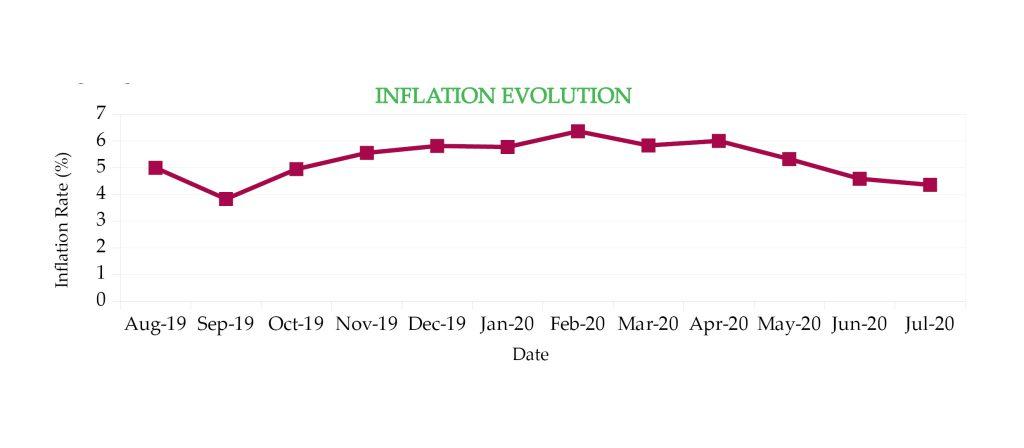
Liquidity
During the month, liquidity increased as a result of government payments which partly offset tax receipts and auction of government securities. The inter-bank rate decreased to 4.27% down from 5.19%. The volume of inter-bank transactions increased from Kshs 6.64 billion to Kshs 12.78 billion. Commercial banks’ excess reserves increased to Kshs 42.70 billion.
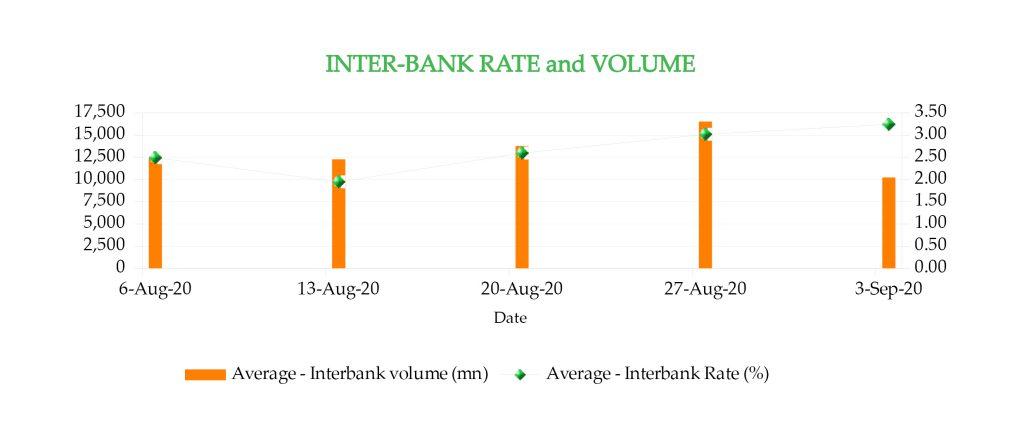
FIXED INCOME
T-Bills
The T-bills recorded an overall subscription rate of 72.8% at the end of the month of April, compared to 151.0% recorded in the previous month. The under subscription is partly attributable to investors’ low confidence in the market. The performance of the 91-day, 182-day and 364-day papers stand at 86.8%, 28.4% and 111.7% respectively. On a monthly basis, the yields on the 182-day and 364-day papers increased by 0.20% and 0.8% respectively to 8.13% and 9.12%. On the other hand, the yield on the 91-day paper remained relatively unchanged at 7.24%.
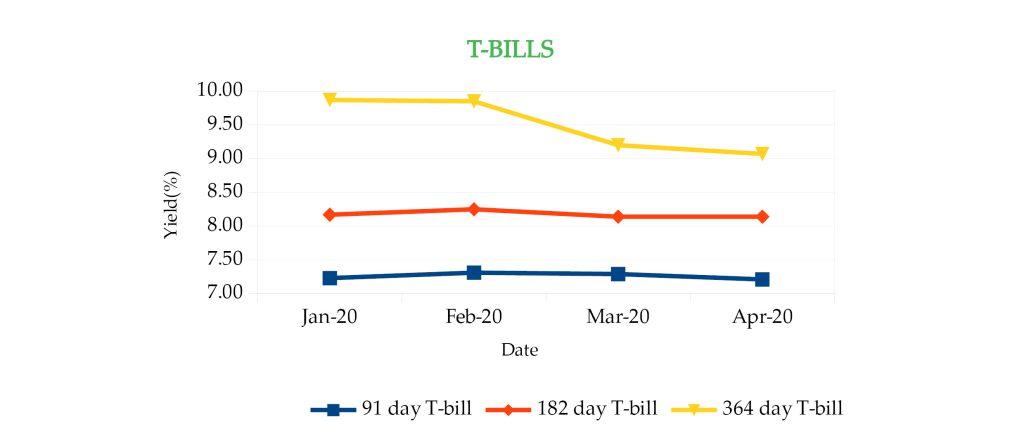
T-Bonds
At the end of the month, the T-Bonds registered a turnover of Kshs 8.42 billion from 151 bond deals. This represents a weekly decrease of 60.18%.
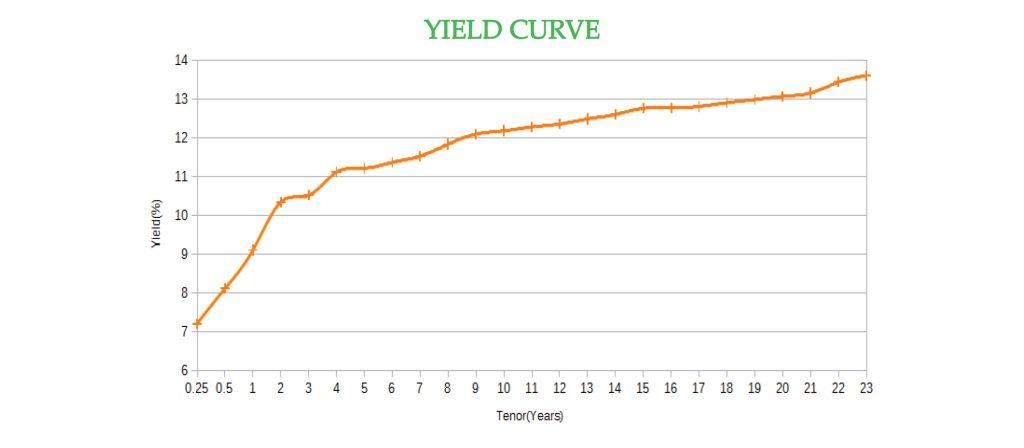
EQUITIES
During the month of August, the market capitalization rose by 7.99% to Kshs 2.14 trillion. Also, total shares traded increased by 7.26% to 42million and equity turnover rose to 1.2billion shares. NASI and NSE 25 gained by 7.8% and 7.4% in that order. The NSE 20 and NASI gained 4.76% and 3.95% respectively on a monthly basis. On a weekly basis, the NASI and NSE 20 gained by 5.5% and 2.7% respectively while NSE 25 declined by 41.04%. The gain in NASI is a result of an appreciation of large-cap stocks such as BAT Kenya, EABL, Diamond Trust Bank and Jubilee Holdings.
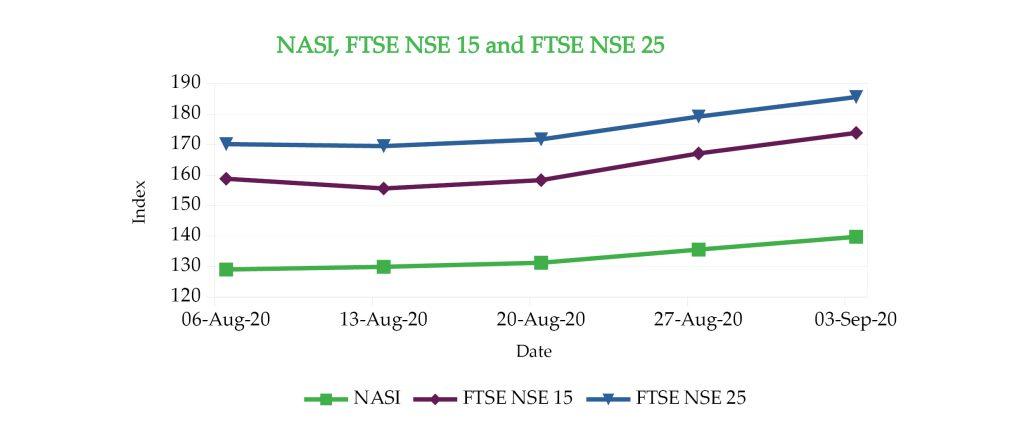
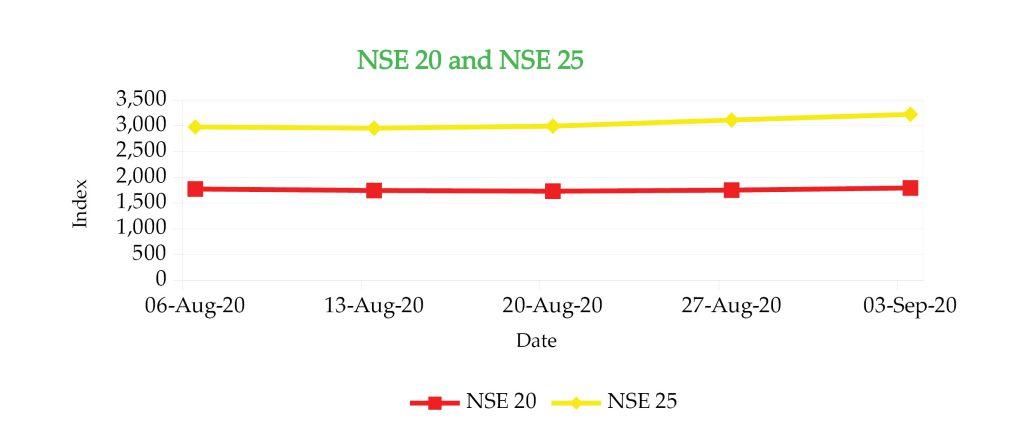
ALTERNATIVE INVESTMENTS
- During the last week of the month, the I-REITs marked a recorded turnover of KShs 1.2million with 36 contracts. The Derivatives market registered a turnover of KShs 14000 with 1 contract.
- Health technology e-commerce company focused on women’s health, Kasha, received $ 1 million investment from Finnish financier, Finnfund. The funding is set to increase the company’s presence in Rwanda and Kenya and to support its expansion into other African countries.
- The World Bank through its private lending arm, the International Finance Corporation (IFC), is set to acquire a $ 15 million minority stake in Naivas. The capital injection is meant for expansion with Naivas’ growth strategy in the short term being, increasing the number of its branches strategically countrywide and scaling up the more capital-intensive food market.
- Swiss impact asset manager responsAbility Investments and EDFI ElectriFI announced their cooperation in the field of climate finance in emerging economies. Under the agreement, EDFI ElectriFI is providing additional first-loss capital for a responsAbility-managed energy debt fund targeting universal access to clean power.
GLOBAL AND REGIONAL MARKETS
| Global Markets | Weekly Change | Monthly Change |
|---|---|---|
| S&P 500 | -2.55% | 1.50% |
| STOXX Europe 600 | -1.13% | -1.86% |
| Shanghai Composite (SSEC) | -2.25% | 0.81% |
| MSCI Emerging Market Index | -0.08% | -0.44% |
| MSCI World Index | -1.75% | 3.35% |
| Regional Markets | Weekly Change | Monthly Change |
|---|---|---|
| FTSE ASEA Pan African Index | -2.20% | -5.87% |
| JSE All Share | -3.23% | -5.87% |
| NSE All Share (NGSE) | 1.17% | 2.91% |
| DSEI (Tanzania) | 2.89% | 4.34% |
| ALSIUG (Uganda) | 4.51% | 8.99% |
Get future reports
Please provide your details below to get future reports: